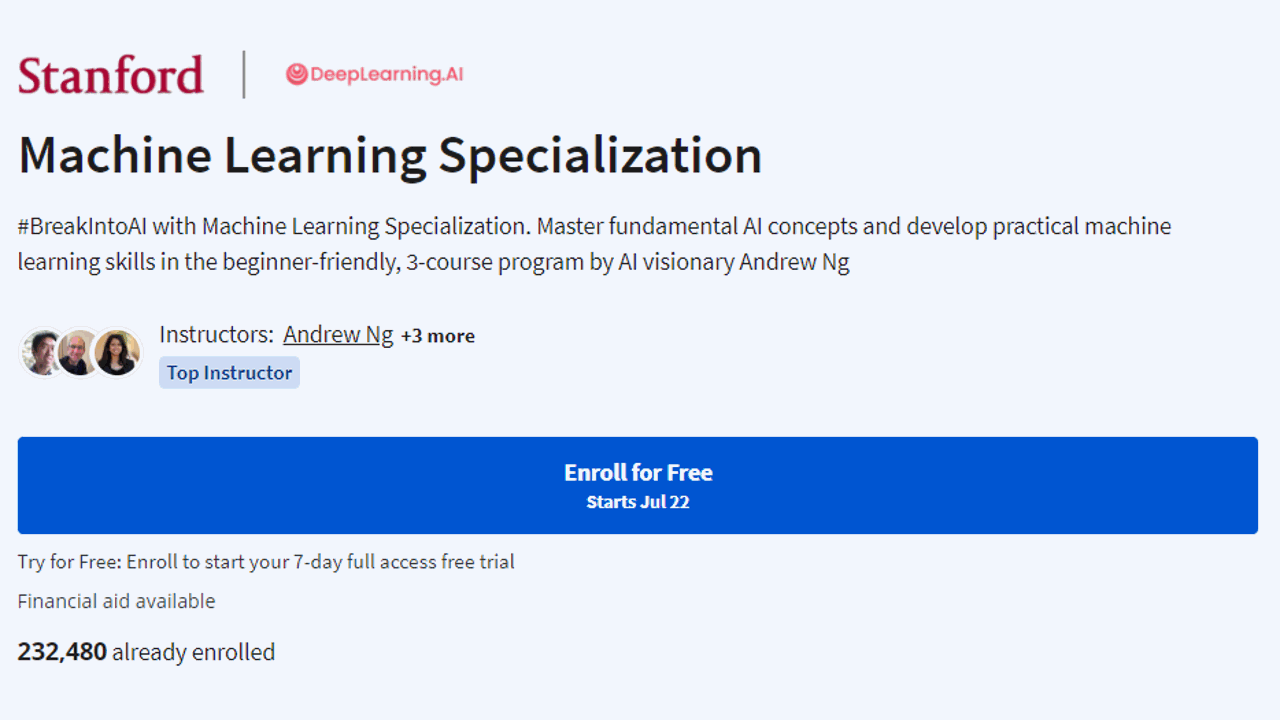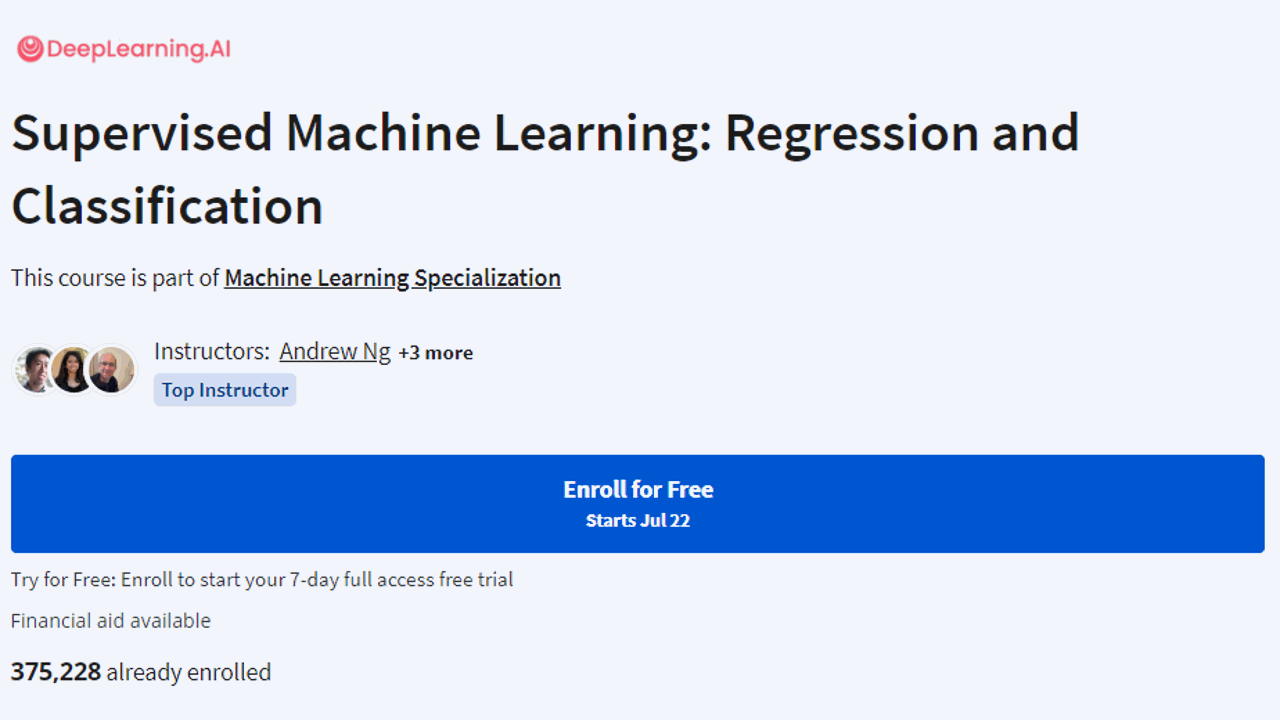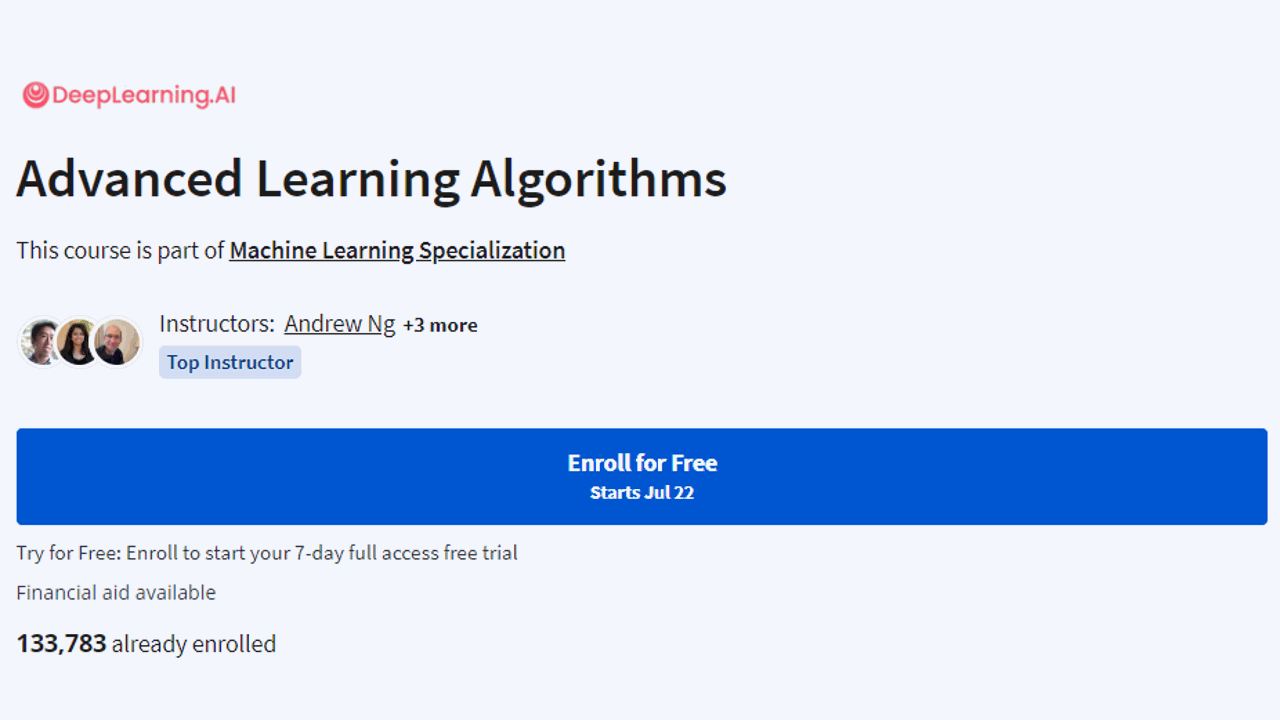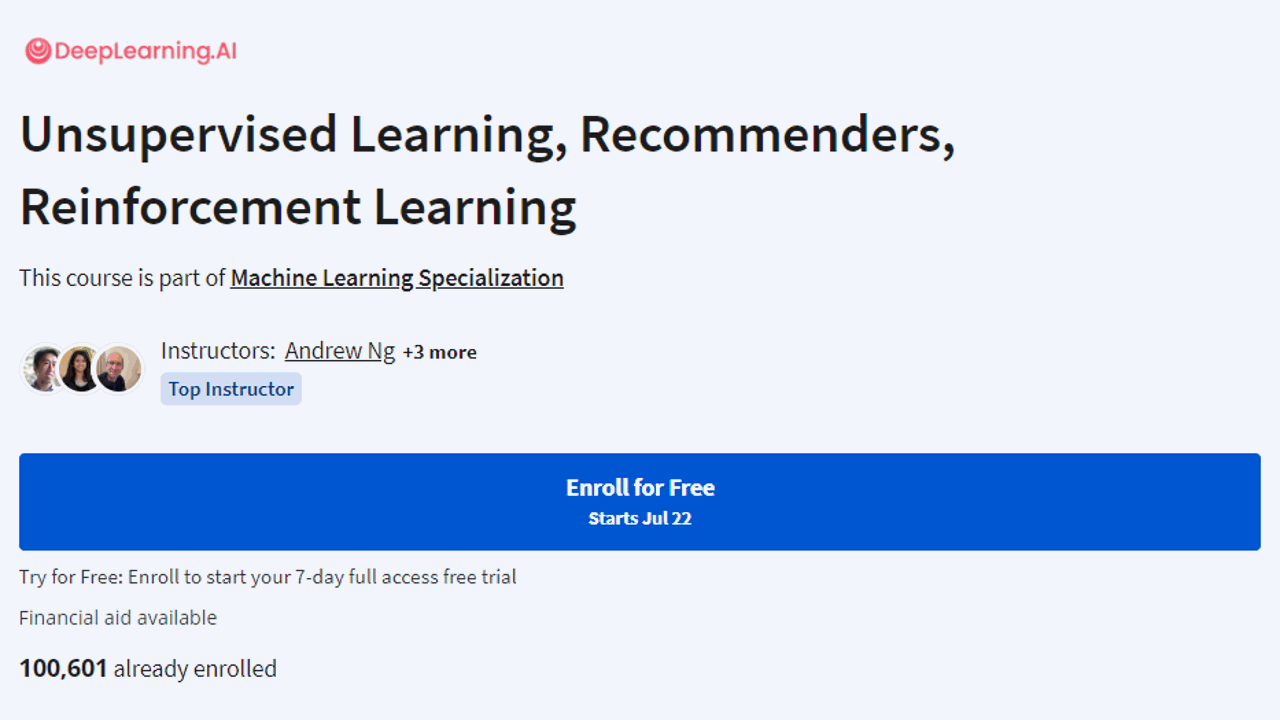- Provider: DeepLearning.AI, Stanford University
- Teacher: Andrew Y. Ng
- Price: $49/month with a 7-day free trial
- Duration: Approx. 3 months if you study 9 hours per week
- Pre-requisites: basic Python programming skills, high school math
- Level: Beginner
- Certificate: Yes
Stepping into the world of machine learning can be daunting, especially when you’re trying to decipher complex topics like regression models, learning algorithms and more.
You could spend hours sifting through information online, but how can you know what’s reliable and what’s not?
The “Machine Learning Specialization” is an evolution of the OG Machine Learning course by Andrew Ng, which I and many of the best data scientists I know have taken to kickstart our careers.
These courses have proven to be a great asset for beginners and professionals alike, breaking down complex topics into manageable chunks.
While some might argue that the courses could offer a bit more depth in certain areas, the clear and comprehensive teaching style of Professor Andrew Ng combined with hands-on practice and interactive elements results in a highly engaging and effective learning experience.
These courses are not just about acquiring technical knowledge, they also focus on industry best practices and applied learning - a critical factor for those looking to break into the field of machine learning.
A Coursera Specialization is a series of courses that helps you master a skill.
Let’s dive deeper into the courses and see what they have to offer.
Course 1: Supervised Machine Learning: Regression and Classification
- Rating: 4.9/5 with 11.493 ratings
- Duration: Approx. 33 hours
I really liked this course and think it’s a great way for anyone to start learning about this topic.
Even if you’re not good at math or computer science, the course makes the tough topics easier to understand.
If you know a bit about calculus and Python, that could help you get more out of the course.
The teacher, Professor Andrew Ng, does a great job breaking down hard ideas into smaller parts that are easier to understand.
The course teaches you both the ideas behind machine learning and gives you hands-on practice to apply what you learn.
You can use Jupyter Notebooks to see examples and write your own code, which can help you really understand the topic.
The course gives you the important info you need without wasting your time, which I think is great.
But it doesn’t go into a lot of detail on some things, like why you would pick a certain loss function for logistic regression.
If you’re just starting out, you might need to look up more info about these topics.
The assignments and labs in the course might not be super challenging, but they help you practice what you’re learning.
Also, even though the course says the labs are optional, you do have to do some coding assignments. This might be a bit confusing at first.
All in all, this course is a really good way to start learning about machine learning.
If you’re interested in machine learning, I’d definitely recommend checking out this course.
What You Will Learn
- Introduction to machine learning, including its applications and differences between supervised and unsupervised learning.
- Detailed understanding of linear regression models, including the cost function formula and intuition behind it.
- Practical experience with implementing gradient descent and understanding the learning rate.
- Extension of linear regression to handle multiple input features and methods for improving model’s training and performance.
- Incorporation of vectorization, feature scaling, feature engineering and polynomial regression for advanced model building.
- Introduction to another type of supervised learning, classification using logistic regression model.
- Understanding of the overfitting problem in machine learning models and methods to handle it using regularization.
- Practical implementation of logistic regression with regularization to tackle overfitting.
Course 2: Advanced Learning Algorithms
- Rating: 4.9/5 with 2.880 ratings
- Duration: Approx. 34 hours
I found this course to be quite insightful. Despite its name, the course is surprisingly beginner-friendly.
Andrew Ng’s teaching style is both intuitive and engaging, making it easier for newcomers to grasp complex concepts.
He effectively demystifies machine learning concepts, making the learning process much less daunting than you’d expect.
The course provides a comprehensive overview of theory content.
It covers principal supervised learning algorithms and even includes hands-on coding components, giving you a taste of practical application.
The mathematical concepts tied to machine learning are often quite intricate, but this course does an excellent job of explaining them through exercises that help you visualize and understand them.
Furthermore, the course touches on real-world applications and industry-related machine learning libraries, providing you with knowledge that’s not just academic, but also practical.
There are, however, a few areas the course could improve on.
Although the assignments help to reinforce what you learn, some students find them too easy.
The course might benefit from more challenging assignments that require a deeper application of the concepts learned.
In addition, while the course does a great job of simplifying complex concepts, some students feel that a bit more mathematical detail, such as calculations for backpropagation, would further enhance their understanding.
But overall, as a seasoned machine learning expert, I would highly recommend this course to beginners interested in the field.
What You Will Learn
- Understand the structure and function of artificial neural networks and how to use them for classification tasks, including coding your own neural network in Python.
- Learn to use the TensorFlow framework for building artificial neural networks and implementing efficient computations using parallel processing.
- Gain knowledge on how to train models in TensorFlow and explore alternative activation functions beyond the sigmoid function.
- Discover how to extend binary classification to multiclass classification and differentiate between multiclass and multi-label classification.
- Investigate the Adam optimizer and its improvement upon regular gradient descent for neural network training.
- Get introduced to various layer types and understand their different utilities.
- Learn best practices for training and evaluating learning algorithms to improve performance and understand the lifecycle of a machine learning model.
- Develop skills to diagnose bias and variance and learn techniques for model selection and performance evaluation.
- Discover decision trees as a practical and commonly used learning algorithm, along with its variations like random forests and boosted trees (XGBoost).
- Understand when and how to use decision trees and their applications.
Course 3: Unsupervised Learning, Recommenders, Reinforcement Learning
- Rating: 4.9/5 with 1.413 ratings
- Duration: Approx. 27 hours
This course offers an excellent introduction to advanced topics that manages to be both comprehensive yet accessible to beginners.
The video explanations are detailed and well-prepared, providing broad exposure to a variety of machine learning problems and potential solutions.
It’s truly a general introduction that doesn’t overwhelm but still manages to be thorough.
One aspect of this course that truly stands out is the interactive element.
Quizzes, hands-on exercises, and discussion forums really promote dynamic learning.
Although the math part can be a bit challenging, the course makes it fun and intuitive to learn about machine learning.
It’s not just about technical knowledge; the course also introduces industry practices and an applied approach which I believe is critical for anyone looking to work in the field of machine learning.
That being said, there are a few areas that could use some improvement.
The unit tests in practice exercises can be frustrating and there is a lack of depth in certain areas.
It’s definitely a course I’d recommend for both seasoned professionals and beginners alike.
What You Will Learn
- Understand the concept of clustering and anomaly detection in unsupervised learning.
- Learn about the K-means intuition and K-means algorithm along with its optimization objective.
- Study how to initialize K-means and choose the correct number of clusters.
- Understand the Gaussian (normal) distribution and its role in anomaly detection.
- Learn to develop and evaluate an anomaly detection system.
- Gain knowledge on making recommendations using per-item features and collaborative filtering algorithms.
- Discover the difference between collaborative filtering and content-based filtering.
- Learn about reinforcement learning and its application in landing a virtual lunar lander on Mars.
- Understand the role of the state-action value function and the Bellman Equation in reinforcement learning.
- Apply your learnings by refining neural network architecture and implementing ε-greedy policy in reinforcement learning.
Frequently Asked Questions
How Long Does It Take To Complete The Machine Learning Specialization?
It’s estimated to take approximately 3 months to complete if you study around 9 hours per week.
This means the total duration of the specialization is roughly 108 hours.
However, the actual time it takes can vary depending on your prior knowledge, learning pace, and the amount of time you can dedicate to the courses each week.
How Much Does The Machine Learning Specialization Cost?
The Machine Learning Specialization on Coursera costs $49 per month.
This fee gives you access to all the course materials, graded assignments, and a certificate upon completion.
The specialization also offers a 7-day free trial, allowing you to explore the course content before committing to the monthly fee.
Please note that prices may vary depending on your location and any promotions Coursera may be running at the time.
Is The Machine Learning Specialization Part Of Coursera Plus?
No. Coursera Plus subscribers do not have access to the Machine Learning Specialization.
What Is The Difference Between A Coursera Course And A Specialization?
A Coursera course is a single, standalone module that focuses on a specific topic. It includes video lectures, readings, quizzes, and sometimes a final project or exam.
Once you complete a course, you receive a certificate of completion.
On the other hand, a Coursera Specialization is a series of related courses designed to help you master a specific topic.
Specializations are structured to provide a deeper, more comprehensive understanding of a subject area.
They often culminate in a capstone project that allows you to apply what you’ve learned throughout the courses.
Once you complete all the courses in a Specialization, you receive a Specialization certificate.
So, the main difference is that a course is a single module on a specific topic, while a Specialization is a series of related courses designed to provide a comprehensive understanding of a broader subject area.
How To Get The Machine Learning Specialization For Free?
Coursera offers financial aid for students who cannot afford the fee.
You can apply for financial aid by clicking on the “Financial aid available” link next to the “Enroll” button on the course page.
You’ll need to fill out an application and wait for approval, which can take up to 15 days.
Also, Coursera occasionally offers promotions or discounts, so it’s worth checking their website regularly.
Please note that while you may be able to access some course materials for free during a trial period, you typically need to pay for the courses to receive a certificate.



